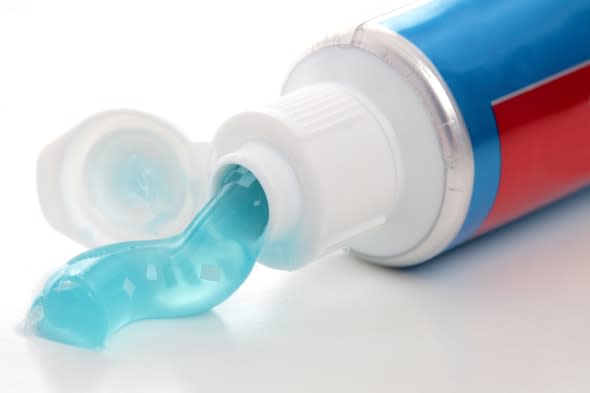How safe is your toothpaste?

A leading dentist has warned that some ingredients found in toothpaste may be detrimental to our health.
Dr Tony Talbot, an expert in restorative dentistry and a member of the Royal College Of Surgeons, tells the Daily Mail that common ingredients have been linked to cancer and other diseases.
"The public are smart, but they need to see past the marketing and be well-informed about what they are buying," he says.
"Some products use a slogan indicating that they are 'the leading products used by dentists', but that's because they send free products to every dentist in the country."
So what are his concerns - and should we be worried?
Sodium Lauryl Sulphate
Sodium Lauryl Sulphate (SLS) is used to stop the toothpaste separating in the tube, and is found in the vast majority of products. But, says Dr Talbot, it opens up gaps between the cells in themouth, allowing toxins from, say, tobacco smoke to get in.
"If I see a patient suffering with recurrent mouth ulcers, one of the first things I do is prescribe the use of a non-SLS toothpaste," says Dr Talbot.
Things aren't entirely clear-cut. NHS advice on mouth ulcers does note that SLS has been suggested as a culprit - but points out that there are plenty of other causes too. And it's worth noting that around 40% of people who have recurrent mouth ulcers report that it runs in their family.
Triclosan
Dr Talbot's also concerned about Triclosan, used in toothpaste as an anti-bacterial agent that fights the germs that cause plaque. "Some animal model studies have shown triclosan has an effect on hormone activity and potential for carcinogenic activity," he says.
But last summer, Patricia Verduin, head of Colgate-Palmolive research and development, said that studies linking triclosan to cancer involved massive doses of the chemical.
"Three different studies in three different animal species have been reviewed by regulators around the world and all have concluded triclosan in Colgate Total is absolutely safe," she said.
Whitening agents
Whitening toothpastes work in one of two ways: through chemical bleaches such as hydrogen peroxide or through abrasive substances such as tiny plastic balls. Dr Talbot says that bleaches damage the gums. And, given that commercially available whitening toothpastes have been shown to have little or no effect, there seems little reason to take the risk. Abrasives, meanwhile, are scratching away at the tooth enamel as well as the stains, and can also damage gums.
As for fluoride, Dr Talbot has only good things to say. "A little addition of fluoride has made significant inroads to improve dental health and help reduce tooth decay," he says. And the British Dental Health Foundation agrees: "Fluoride toothpaste is very effective in preventing tooth decay," it says.
Read more on AOL Money:
Could your toothpaste give you cancer?
How much should you pay for your toothpaste?
Where does it cost the most to see the dentist in the UK?




